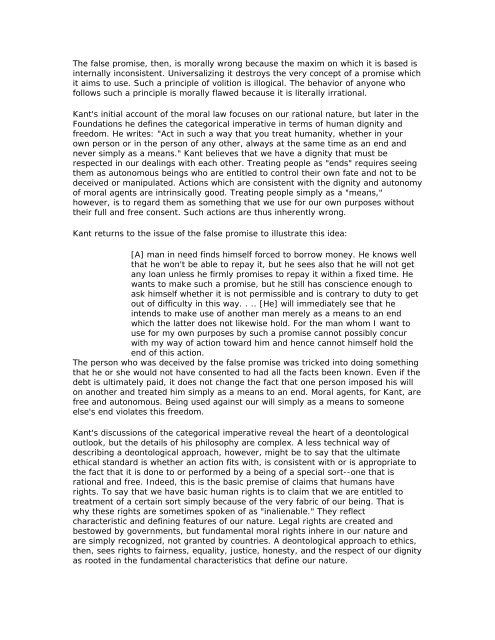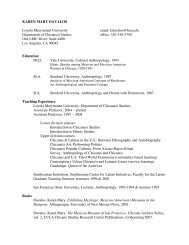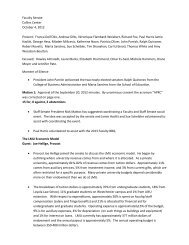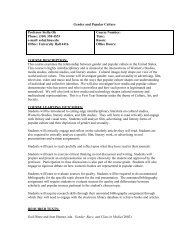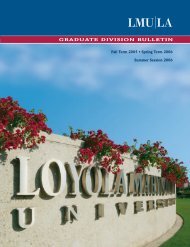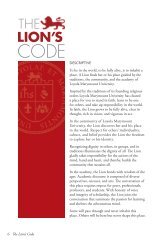PHILOSOPHICAL ETHICS Adapted from Thomas White, "Ethics ...
PHILOSOPHICAL ETHICS Adapted from Thomas White, "Ethics ...
PHILOSOPHICAL ETHICS Adapted from Thomas White, "Ethics ...
You also want an ePaper? Increase the reach of your titles
YUMPU automatically turns print PDFs into web optimized ePapers that Google loves.
The false promise, then, is morally wrong because the maxim on which it is based is<br />
internally inconsistent. Universalizing it destroys the very concept of a promise which<br />
it aims to use. Such a principle of volition is illogical. The behavior of anyone who<br />
follows such a principle is morally flawed because it is literally irrational.<br />
Kant's initial account of the moral law focuses on our rational nature, but later in the<br />
Foundations he defines the categorical imperative in terms of human dignity and<br />
freedom. He writes: "Act in such a way that you treat humanity, whether in your<br />
own person or in the person of any other, always at the same time as an end and<br />
never simply as a means." Kant believes that we have a dignity that must be<br />
respected in our dealings with each other. Treating people as "ends" requires seeing<br />
them as autonomous beings who are entitled to control their own fate and not to be<br />
deceived or manipulated. Actions which are consistent with the dignity and autonomy<br />
of moral agents are intrinsically good. Treating people simply as a "means,"<br />
however, is to regard them as something that we use for our own purposes without<br />
their full and free consent. Such actions are thus inherently wrong.<br />
Kant returns to the issue of the false promise to illustrate this idea:<br />
[A] man in need finds himself forced to borrow money. He knows well<br />
that he won't be able to repay it, but he sees also that he will not get<br />
any loan unless he firmly promises to repay it within a fixed time. He<br />
wants to make such a promise, but he still has conscience enough to<br />
ask himself whether it is not permissible and is contrary to duty to get<br />
out of difficulty in this way. . .. [He] will immediately see that he<br />
intends to make use of another man merely as a means to an end<br />
which the latter does not likewise hold. For the man whom I want to<br />
use for my own purposes by such a promise cannot possibly concur<br />
with my way of action toward him and hence cannot himself hold the<br />
end of this action.<br />
The person who was deceived by the false promise was tricked into doing something<br />
that he or she would not have consented to had all the facts been known. Even if the<br />
debt is ultimately paid, it does not change the fact that one person imposed his will<br />
on another and treated him simply as a means to an end. Moral agents, for Kant, are<br />
free and autonomous. Being used against our will simply as a means to someone<br />
else's end violates this freedom.<br />
Kant's discussions of the categorical imperative reveal the heart of a deontological<br />
outlook, but the details of his philosophy are complex. A less technical way of<br />
describing a deontological approach, however, might be to say that the ultimate<br />
ethical standard is whether an action fits with, is consistent with or is appropriate to<br />
the fact that it is done to or performed by a being of a special sort--one that is<br />
rational and free. Indeed, this is the basic premise of claims that humans have<br />
rights. To say that we have basic human rights is to claim that we are entitled to<br />
treatment of a certain sort simply because of the very fabric of our being. That is<br />
why these rights are sometimes spoken of as "inalienable." They reflect<br />
characteristic and defining features of our nature. Legal rights are created and<br />
bestowed by governments, but fundamental moral rights inhere in our nature and<br />
are simply recognized, not granted by countries. A deontological approach to ethics,<br />
then, sees rights to fairness, equality, justice, honesty, and the respect of our dignity<br />
as rooted in the fundamental characteristics that define our nature.


